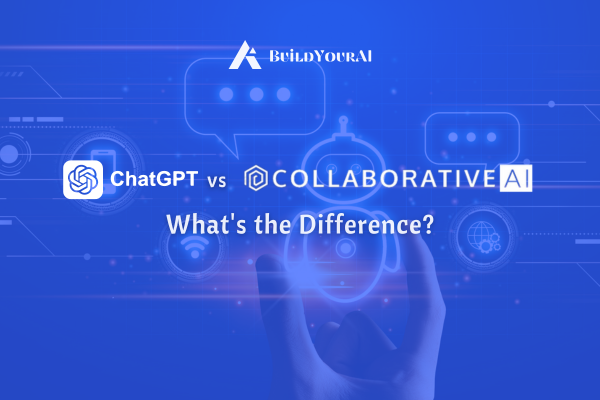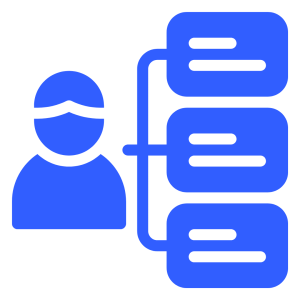Blogs

ChatGPT vs CollabAI - What's the Difference?
Blog
May 28, 2024 • 3 min read
The world of artificial intelligence is rapidly advancing, and two powerful tools have emerged as game-changers: ChatGPT and CollabAI. While both offer incredible capabilities, they differ in their core features and use cases. In this article, we’ll explore the key differences between these two AI powerhouses, helping you determine which one best suits your needs.
Understanding ChatGPT
![]()
Developed by OpenAI, ChatGPT is a conversational AI model designed to engage in natural language interactions. It utilizes the cutting-edge GPT-4 architecture, which excels at generating coherent and contextually relevant responses. Here are the key strengths of ChatGPT:
- Conversational Prowess: ChatGPT shines in casual, conversational scenarios. It can answer queries, engage in chitchat, and even generate content like articles or stories, albeit with the need for human editing.
- Individual Focus: ChatGPT is primarily tailored for individual users seeking a virtual assistant or a conversational AI companion.
- Limited Context Window: ChatGPT operates within a limited context window (32K tokens), making it ideal for generating responses within a confined scope, such as answering specific questions or generating short-form content.
Understanding CollabAI
![]()
CollabAI, on the other hand, is an open-source AI assistant platform designed for team collaboration and enterprise-level applications. It offers access to a wide array of advanced models like GPT-4, Gemini, and Claude, enabling organizations to create AI assistants customized to their unique requirements.
It is designed to be self-hosted, allowing businesses to tailor their AI tools to meet their unique needs and keep their data secure on their own servers. CollabAI includes features such as team management, prompt templates, and chat storage and retrieval, making it a comprehensive solution for businesses looking to integrate AI into their operations.
With features like team management, prompt templates, chat storage, and file integration, CollabAI empowers businesses to integrate AI seamlessly into their operations. It ensures data privacy and security, addressing concerns about handling sensitive information.
- Collaborative Workspace: CollabAI provides a secure shared space for team members to collaborate, brainstorm, and generate content together.
- Customizable AI Models: Users can create specialized versions of ChatGPT tailored to their specific team needs and workflows, ensuring relevant and accurate responses for their unique use cases.
- Admin Tools: CollabAI offers robust admin tools for managing team access levels, permissions, and usage analytics, ensuring secure and controlled AI deployment within an organization.
Comparing Use Cases

While both tools leverage the power of AI, their use cases differ significantly:
ChatGPT: ChatGPT excels in personal assistant scenarios, such as answering queries, generating content ideas, or engaging in casual conversations. It’s an excellent tool for individuals seeking a conversational AI companion.
CollabAI: CollabAI, on the other hand, is designed for team collaboration and enterprise-level applications. It allows organizations to create customized AI models tailored to their specific workflows, boosting productivity and enabling secure collaboration on sensitive projects.
Data Privacy and Security
Both ChatGPT and CollabAI prioritize data privacy and security. Neither platform trains on or retains user data or conversations, ensuring that sensitive information remains under the user’s control at all times.
Comparison Between GPT and CollabAI
|
Feature |
CollabAI |
ChatGPT |
|
Type |
Open-source AI assistant platform |
AI language model |
|
Customization |
Highly customizable for specific business needs |
General purpose model with limited customization |
|
Hosting |
Self-hosted on business servers for enhanced data security |
Hosted by OpenAI, with API access for users |
|
AI Models |
Supports multiple AI models including GPT-4, Gemini, and Claude |
Utilizes specifically the GPT-4 architecture |
|
User Target |
Designed for teams and organizations |
Designed for individual and commercial use |
|
Cost |
Cost-effective, open-source solution |
Priced according to OpenAI’s pricing models |
|
Features |
Team management, prompt templates, assignable AI assistants to departments, tagging in chats, and more |
Primarily conversational with basic features like text generation and completion |
|
Specialty |
Optimized for interdepartmental teamwork and workflow automation |
Specialized in conversational tasks, content generation, and fine-tuned responses |
|
Data Security |
Data remains on the user’s server, ensuring proprietary information security |
Data privacy ensured by OpenAI, but resides on external servers |
|
Real-World Applications |
Can enhance enterprise productivity, automate complex business processes |
Suitable for chatbots, customer support, personal assistants |
|
Additional Tools |
File upload & GPT-4 vision integration, future enhancements such as API function calls and Python code execution |
Typically limited to text input and output; vision capabilities may be available but less integrated |
1. Customization Capabilities
While GPTs excel at general tasks, CollabAI allows deeper customization, enabling businesses to craft AI assistants aligned with their brand voice, customer service goals, and specific use cases. This level of control is crucial for companies looking to implement AI front-and-center in their operations.
2. Performance and Consistency
GPTs’ large language models, while impressive, can occasionally generate inaccurate or inappropriate responses, which can be problematic for businesses. CollabAI’s commitment is to develop advanced customization tools that provide reliable and consistent performance, addressing the bottom 10% of responses that could potentially harm a company’s reputation.
3. Integration and Scalability
CollabAI solutions are engineered to grow with businesses and integrate seamlessly with existing tools and workflows. This level of integration ensures AI assistants are not separate components but integral parts of the business, a feature that generic GPTs may struggle to match.
4. Transparency and Insights
CollabAI offers transparency into the AI’s decision-making process, allowing users to pinpoint the specific knowledge base sections influencing responses. This level of insight empowers businesses to refine their knowledge bases, ensuring accurate and reliable AI performance.
5. Personalized Support
CollabAI recognizes that every business has unique needs and challenges. Their team works closely with clients to ensure AI solutions align perfectly with business objectives, offering personalized support and collaboration often missing from general-purpose AI solutions.
6. Analytics and Improvement
Robust analytics tools enable businesses to track and analyze their AI assistants’ performance, facilitating data-driven improvements and customization. This iterative process ensures the AI evolves in response to real-world interactions, a capability often lacking in general-purpose GPTs.
The potential future developments of GPT include improving its ability to generate human-like text, reducing biases and inaccuracies in its responses, and expanding its applicability to new domains. CollabAI might evolve by offering new functionalities such as API-based function calls, Python code execution, and integration with other APIs.
In summing up, while ChatGPT provides a fantastic resource for individuals and is great for conversational AI, CollabAI is a powerhouse for team-oriented, customizable AI applications – a real boon for businesses eyeing the future. As we continue to embrace AI solutions, platforms like CollabAI are not just luxuries but necessities for staying ahead in this digitally-driven world. Whether you are an entrepreneur, a developer, or an organization, it’s time to explore what CollabAI can do for you.

Shahed Islam
